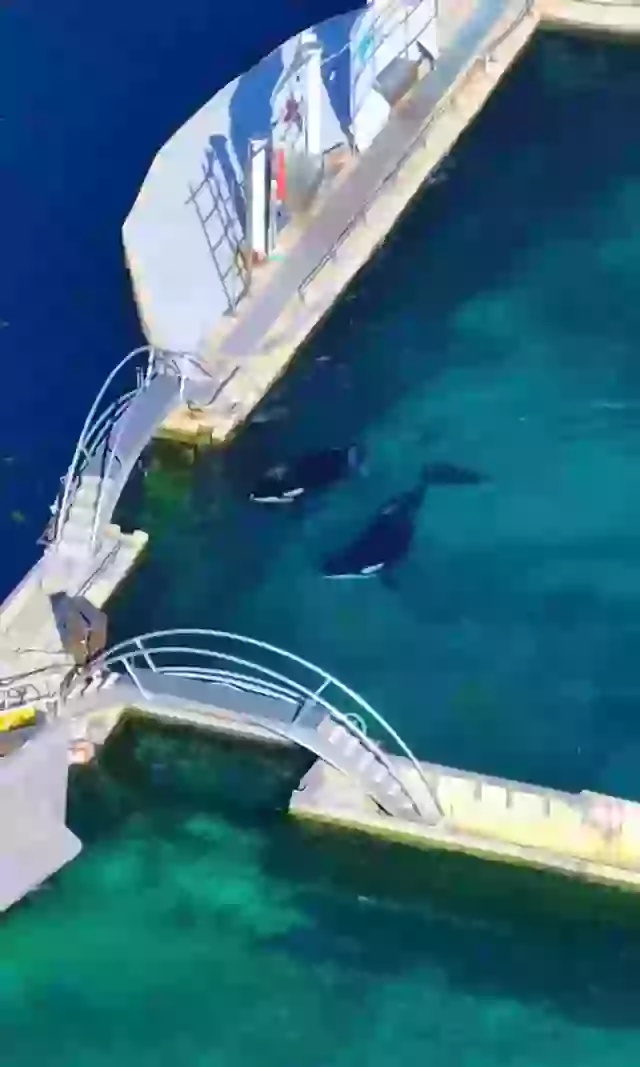Heartbreaking Video Captures Two Orcas Stuck In Empty Marine Park Months After Shutdown
When marine parks close, the question of what happens to the animals left behind is often overlooked. In the case of Marineland Antibes in France, the spotlight has now fallen on two orcas, Wikie and her son Keijo, who are still swimming in circles in a tank months after the park closed its doors.
Located in southeastern France, the once-popular aquatic zoo is now closed to the public, but not much has changed for the animals still inside. Online footage shows Wikie, 23, and 11-year-old Keijo gliding around their enclosure without real purpose or stimulation. Both were born in captivity and have never known life outside of concrete walls.
French authorities are working on relocating the pair, but finding the right place has proven complicated. Several zoos have offered to take them in, but animal welfare groups argue that another zoo isn’t the answer.
They’re pushing for something better: a seaside sanctuary that offers more space, a natural environment, and freedom from being bred or performing for crowds.
One of the loudest voices calling for sanctuary placement is Lori Marino, president of The Whale Sanctuary Project. The organization has a site in Nova Scotia, Canada, which Marino says is ready to take the orcas.
“We’re the only option left,” she told the BBC. She added that their team has already conducted the necessary water and environmental studies and even secured a lease from the Canadian government.
Wikie and Keijo have remained at the abandoned marine park since it closed in January.
But French officials rejected the proposal earlier this year, citing ecological concerns. Instead, the French ecology minister, Agnès Pannier-Runacher, said she hopes to find a sanctuary in Europe, although no specific site has been confirmed.
That’s a central sticking point. Marino's assessment clearly stated:
“If you don’t even have a site, you’re years away from being a viable sanctuary.” For her and others advocating for the whales, Nova Scotia offers something concrete, not just promises.

David Phillips, director of the International Marine Mammal Project at Earth Island Institute, agrees. On the group’s website, he emphasized the need for a better environment for Wikie and Keijo:
“We have been strong advocates for the past year that these two orcas should be relocated to a seaside sanctuary, which would be larger, in natural seawater, and save them from repetitive performances in concrete tanks.”
Phillips also pointed out that Nova Scotia wasn’t just their preferred choice; it had previously been identified by the French Ministry’s own Inspector General’s Report as the best available option.
“Orcas don’t belong in concrete tanks,” he said plainly. “They belong in the ocean.”
One recent decision may have bought the orcas some time. Authorities had considered moving them to Loro Parque Zoo in Tenerife, but that plan was blocked.
“The Spanish government deserves credit for stopping the relocation into the dangerous, unsafe tanks of Loro Parque Zoo,” Phillips added.
Ethical Considerations in Marine Parks
Marine biologist and animal welfare advocate Dr. Ingrid N. Visser emphasizes the moral obligations we hold towards marine mammals in captivity. She argues that orcas, being highly intelligent and social creatures, require environments that meet their complex behavioral needs.
Dr. Visser points out that the confinement of Wikie and Keijo in an empty marine park illustrates a failure in ethical stewardship. In her view, transitioning these animals to sanctuaries where they can experience a more natural habitat is crucial for their well-being.
"Orcas abandoned in shuttered marine park filmed in algae-infested pool months after closure "
As the debate continues, the orcas remain in limbo. They’re not alone; around a dozen dolphins are still housed at Marineland Antibes, with their future equally uncertain.
The longer this drags on, the more questions are raised. Will a European sanctuary come through? Can international cooperation fast-track the move to Canada? Or will these orcas continue to wait, day after day, in a tank that’s no longer part of a functioning park?
What’s clear is that the clock is ticking. And for Wikie and Keijo, who have spent their entire lives in captivity, a change of scenery is long overdue.
Animal behaviorists suggest that proactive measures should have been taken to prepare for the closure of Marineland Antibes. For instance, implementing a phased transition plan for the orcas could have facilitated their relocation to a sanctuary before the park's shutdown.
According to marine mammal expert Dr. Naomi Rose, such strategies not only alleviate stress for the animals but also enhance public awareness about the importance of conservation. By prioritizing animal welfare, marine parks can set a precedent for responsible management in the industry.
Healing Approaches & Techniques
The plight of Wikie and Keijo serves as a stark reminder of the ethical dilemmas surrounding marine parks. Experts like Dr. Ingrid N. Visser and Dr. Naomi Rose advocate for a shift towards sanctuaries that prioritize animal welfare and rehabilitation. This approach not only caters to the physical needs of marine mammals but also addresses the psychological impacts of confinement.
To avoid similar situations in the future, marine parks should develop comprehensive transition plans that consider the well-being of their animals. By doing so, they can contribute to a more humane and sustainable future for marine life.



